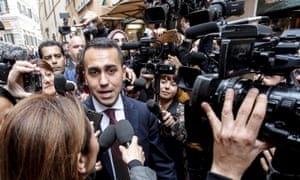Italy’s unlikely new coalition partners, the anti-establishment Five Star Movement (M5S) and the far-right League, disagree on so much that the new government will have a “conciliation committee” to settle its internal differences.
But on some things, most notably an avowed desire to stick it to Europe, the two rival parties agree, and if they follow through on their promises Italy will be set on a collision course with the EU. The question is: will they? Much suggests they will not.
As cabinet positions are being debated in Rome, the situation certainly looks awkward. An early clash looms over immigration: the coalition contract envisages an 18-month limit for the asylum process, the detention of irregular migrants, and the repatriation of half a million people to their countries of origin – most of it in violation of EU law.
Another, over Russia, could come as soon as next month, when EU leaders are scheduled to roll over sanctions that the government accord – which describes Moscow as a possible partner rather than as enemy, of Europe, and certainly not a military threat – demands be lifted.
The loudest alarm bells are ringing over the parties’ stated ambition to rewrite the EU’s rules, and their seemingly dichotomous domestic policies, which combine the rises in public spending promised by M5S with the tax cuts favoured by the League.
The coalition contract says economic governance in the EU, “based on the dominance of the market rather than the broader social and economic dimension”, must be reviewed, and the single market reformed to “avoid prejudicial effects on national interests”.
If he ends up getting the job – which is far from certain – the coalition partners’ mooted economy minister, Paolo Savona, could cause ructions. A former industry minister who opposed the signing of the Maastricht Treaty, Savona calls the euro a “German cage”.

Europe has made little secret of its concern. As the European commission unveiled its economic advice to member states, the body’s finance commissioner, Pierre Moscovici, expressed what sounded like a forlorn hope.
“We are hoping for cooperation [from Italy], on the basis of dialogue, respect and mutual trust,” he said. Earlier this week the trade commissioner, Cecilia Malmstöm, said“there are some things there that are worrying” about Italy’s incoming government.
Economists calculate the cost of the coalition’s promises – lower taxes, higher benefits, earlier retirement – could reach €170bn (£150bn), or about 10% of Italy’s GDP. This would add to the country’s €2.1trn debt mountain and potentially trigger the EU’s worst-case scenario: a Greek-style debt crisis in the eurozone’s third-biggest economy.
But in contrast to foreign commentators, many Italian analysts are sceptical that Eurogeddon is inevitable, or even particularly likely.
The government contract is vaguely worded and amounts to little more than a manifesto, they note. Behind the fierce anti-European rhetoric and bluster – a feature of the two populist parties’ election campaigns – there are few indications the new government will seek a serious showdown with the EU.
Giuseppe Conte, the lawyer and academic with no political experience tasked on Wednesday with trying to form the new government, will have his work cut out simply finding acceptable compromises between the mutually antagonistic M5S and League and their respective leaders, Luigi Di Maio and Matteo Salvini.
Italian presidents have rarely used their constitutional powers to veto proposed government laws, but if he finds himself faced with policies he considers fiscally irresponsible or likely to lead to open conflict with Europe, Sergio Mattarella may decide there is a first time for everything.
A significantly more formidable obstacle to the new government’s putative programme may prove to be the 318-seat senate, through which all new legislation must pass and where the coalition partners – not known for their voting discipline – have a slim seven seats.
Salvini has promised that the coalition will “respect rules and commitments” and that Europe had “nothing to worry about”: the new government aims to “grow Italy and create jobs, bring companies to Italy to invest [and] make work more stable”.
This is, however, Italy’s 66th government since the end of the second world war. Given the obvious tensions, obstacles and constraints, both domestic and international, that it will face, few would bet on its chances of surviving long enough to mend Italy, let alone stick it to Europe.